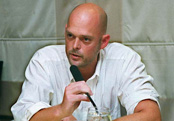 On Monday of last week, veteran journalist Nate Thayer found himself making headlines when he published correspondence between himself and Olga Khazan, an editor at The Atlantic. Khazan had asked Thayer if he would be willing to redraft a 4,200 word article he had published on “Basketball diplomacy” into a 1,200 word article for their site. However, Khazan said that she would not be able to pay for the rewrite and Thayer sternly declined the offer.
On Monday of last week, veteran journalist Nate Thayer found himself making headlines when he published correspondence between himself and Olga Khazan, an editor at The Atlantic. Khazan had asked Thayer if he would be willing to redraft a 4,200 word article he had published on “Basketball diplomacy” into a 1,200 word article for their site. However, Khazan said that she would not be able to pay for the rewrite and Thayer sternly declined the offer.
While The Atlantic was forced to admit that the offer was a mistake and offer an apology to Thayer, the controversy quickly took a different turn when it was revealed that Thayer’s original article may have had some ethical issues.
Though the issues seem to have been first noticed by Reuters reporter Felix Salmon, it was author and journalist Jeremy Dunn who really drilled into the matter.
According to Dunn and Thayer’s other accusers, Thayer’s article pulls heavily from a 2006 story by Mark Zeigler in the San Diego Union-Tribune. Though Thayer does attribute the article, in the original version of the story, he did not provide the author’s name, the title of the article or a link to it.
However, the bigger issue was that Thayer only attributed one fact to the article but it appears that he pulled several quotes from it. Worse still, Thayer’s original article made it appear that the quotes came from interviews he performed.
Zeigler himself has also spoken out on the issue, saying that, while he’s not prepared to call Thayer a plagiarist, that he is “mildly concerned” with the level of attribution provided.
“I don’t think just highlighting a few words of type in a different color necessarily qualifies as a proper attribution,” Zeigler said.
Thayer has since edited the article involved to add more links to the source, however, the controversy remains.
At the heart of the discussion is whether or not what Thayer did amounts to plagiarism. While he did attribute the source, he failed to attribute every fact and quote he pulled from it and he failed to provide the attribution in a way that is seen as adequate.
But is it plagiarism? Dunn obviously believes so and points out, correctly, that doing something similar in an academic paper would quickly lead to an ethics investigation followed by either a retraction or other disciplinary action.
However, journalism, in particular online journalism, has different standards than academia, which in turn is different from much of the Web.
One thing that the Internet is doing is bringing these different standards and views of plagiarism together, with mixed results. This can make it very difficult to find a consistent voice on what is plagiarism and what constitutes adequate attribution when dealing with online works.
However, with Thayer’s case, there seems to be at least a general sense of discomfort. Though not everyone is willing to call Thayer’s actions plagiarism, almost no one is approving of what he did.
So, even if not much bad comes out of this case for Thayer, it’s still likely that this discussion is going to be used as a case study in future discussions about plagiarism and citation on the Web.
It’s the type of case that, while clear enough to have a good consensus, treads far enough into the gray area to help provide some clarity and guidance to future disputes.
In short, the same as judges and lawyers seek precedent when trying to decide legal disputes, this type of case and the reaction to it provide guidance for others down the road, whether they’re authors wondering how to cite or editors trying to determine what their policies should be.
Related
How the rise of freelancing changes plagiarism in journalism
Related
Topics: Current Events